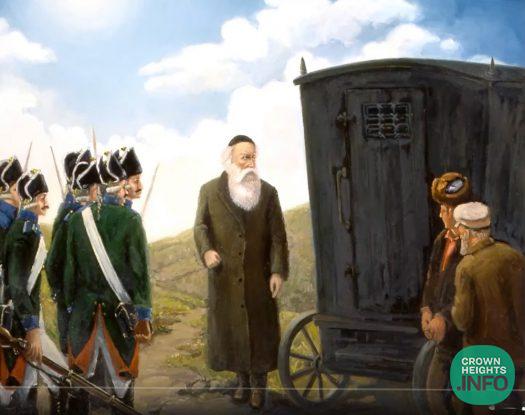
Weekly Story: Yes They Are Alive
Rabbi Sholom DovBer Avtzon
Quite often I post a story I heard recently that not always is connected to the parsha of the week. This week I am posting something that is connected to the parsha, and is a continuation of the posts that are connected to the campaign of 120 years since the Rebbe’s neshoma came down to this earth.
As always your comments are most appreciative. I therefore take this opportunity to those who gave me additional details about last week’s article.
As is known, during the Alter Rebbe’s second arrest, many of the misnagdim were against perpetuating the machlokes (argument) between the two groups, and they joined forces with the chassidim to obtain the Alter Rebbe’s release and freedom.
The opportunity happened when the Czar (Pavel/Paul1) was assassinated and the custom was that the first petitions presented to the new Czar Alexander 1, were granted. Utilizing their connections it was arranged that the petition to free the Alter Rebbe was included in that batch and he was allowed to leave Petersburg.
In appreciation to their efforts, the Alter Rebbe agreed to their request and he went to visit three outstanding rabbinical or leaders of the misnagdim. The hope was that this meeting will foster a new era of respect and acceptance of each other and there will be peace among the Jewish community.
The first Rov the Alter Rebbe visited was Reb Moshe Chefetz. Initially, Reb Moshe basically ignored his guest and did not greet him as a contemporary, but decided to test him with various general questions, such as how many arguments are there between Abaya and Rava. When the Rebbe answered all of the questions he realized that his guest is a real Talmud chacham and he said; I will now ask a question that is bothering me for quite a while. I have asked it to numerous scholars but no one has been able to answer it satisfactory
The midrash in parshas ki sissa states as soon as Moshe Raibeinu heard from Hashem that He intends on destroying the Jewish people, he pleaded that they be spared.
Hashem replied I will give you the same opportunity I offered Avrohom Avinu. I will spare them if you can find for me ten tzaddikim in whose merit they should be saved.
Moshe Raibeinu replied Agreed! The ten are me, Aharon, his two sons Eliezer and Isamer, Pinchos, Yehoshua, and Calev.
Hashem responded but that is only seven and the agreement was that you will present to Me ten!
Moshe then asked Chaim, are the Avos alive? To which Hashem responded in the affirmative Chaim, they are alive.
Moshe triumphantly exclaimed, So there are ten tzaddikim and Hashem agreed and spared the Jewish people.
Yet the midrash says in Devorim parshas Eikev that Hashem said that He would spare the Jewish people only if there are eighty tzaddikim.
Moshe replied I will present to You the eighty you requested. The seventy members of the Sanhedrin plus the same seven the first midrash mentioned.
Hashem responded, but that is only seventy-seven, you are missing three. The midrash continues as above, Moshe asked “Chaim, are the avos alive?” and when Hashem responded yes, they are alive, Moshe said they complete the eighty.
So my question is what is the meaning or reason of these two midrashim, why does the first one state that ten tzaddikim were sufficient to save the Jewish nation and the second one says that eighty were needed?
Without hesitation, the Alter Rebbe replied it is an argument of two tannaiim in a Mishna.
Quickly reviewing in his mind every Mishna, Reb Moshe couldn’t find it so he inquired where is that Mishna and the Alter Rebbe responded it is in seder nizikin.
Reb Moshe quickly reviewed the entire nizikin but once again couldn’t decipher which Mishna the Alter Rebbe was alluding to, so he respectfully asked where
The Alter Rebbe responded, the mishna in Horius (chapter 1, Mishna 5), discusses when the Sanhedrin (high court) made a mistake and because of that a majority of Bnei Yisroel sinned, how many korbonos (sacrifices) have to be brought.
One opinion (Reb Meir) says just one for the entire nation as the Sanhedrin brings it, while the other opinion (Reb Yehudah) says twelve sacrifices have to be brought, one for (by) each tribe.
So the midrash in ki sissa follows the first opinion of Reb Meir that only one sacrifice has to be brought as all Jews are considered one nation. Therefore there it states that one group of ten tzaddikim is sufficient to protect and save the nation.
While the midrash in Devorim follows the opinion of Reb Yehudah that each tribe brings a sacrifice on its own.
How many tribes sinned with the golden calf? Eleven, as the tribe of Levi did not sin.
So Hashem demanded ten tzaddikim per tribe, which is a total of one hundred and ten, but for some reason, as will be explained Hashem said eighty tzaddikim.
Moshe understood why Hashem said eighty and he replied, I have seventy-seven that is seven per tribe and the Avos count as three adding to eighty.
But it also adds to one hundred and ten as they are added to the seven I presented you for each individual tribe so each tribe has ten tzaddikim protecting them.
(Author’s note: Another difference between these two midrashim, is according to the first one, Moshe understood on his own to ask and then add the three avos (forefathers). While according to the second midrash, which follows the opinion of Rav Yehudah, (who incidentally the Halachah is like his opinion, Hashem hinted to Moshe, find me three individuals that can be counted like thirty-three, and then he understood that Hashem is alluding to the Avos).
Rabbi Avtzon is a veteran mechanech and the author of numerous books on the Rebbeim and their chassidim. He can be contacted at avtzonbooks@gmail.com










